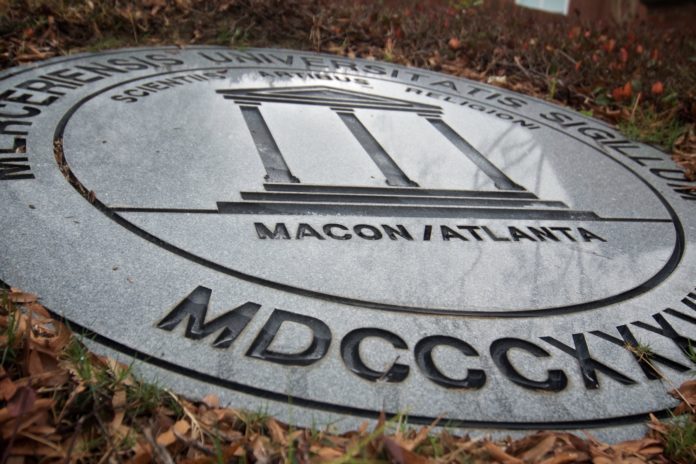MACON — Nobel Laureate Dr. Vernon L. Smith will speak at Mercer University on Monday, March 16, as part of the Eugene W. Stetson School of Business and Economics “Readings in Political Economy” guest lecture series. The event begins at 6 p.m. in the Medical School Auditorium on Mercer’s Macon campus. The lecture, on experimental economics, is free and open to the public.
Dr. Smith is a pioneer in the field of experimental economics and won the 2002 Nobel Prize in Economics for his work in it. Experimental economics is the application of experimental methods to test the validity of economic theories. The field of experimental economics has consistently demonstrated the efficiency of markets, leading to major policy changes in the electricity and financial markets, said Dr. Scott Beaulier, chair of the Economics Department and assistant professor.
“We are thrilled — just thrilled — to be welcoming Dr. Smith to campus,” Dr. Beaulier said. “This will be a fascinating opportunity to hear from one of the brightest economic minds in the world for our students, for the University and for the community.”
Dr. Smith serves as professor of economics and law at Chapman University, in Orange, Calif. He has published hundreds of academic articles and has published three books on experimental economics, including: Papers in Experimental Economics (1991), Bargaining and Market Behavior (2000) and Rationality in Economics: Constructivist and Ecological Forms (2008). More recently, his op-ed writing in outlets like the Wall Street Journal has been critical of policymakers for trying to prevent the housing bubble from bursting.
The event on March 16 is one of a number of lectures by prominent economists this semester that are part of a course developed by Dr. Beaulier through a grant from the Charles G. Koch Charitable Foundation.
Other lectures remaining in the series include:
Dr. Peter Boettke
6 p.m., Tuesday, March 31
Topic: Lawlessness and Self-Regulation of Markets
Medical School Auditorium
Dr. Boettke is the BB&T Professor for the Study of Capitalism, vice president for research, and research director for the Global Prosperity Initiative at the Mercatus Center at George Mason University. He is also a university professor of economics at George Mason and the deputy director of the James M. Buchanan Center for Political Economy. He is the author of three books on the history, collapse and transition from socialism in the former Soviet Union and he is also the co-author, along with David Prychitko and Paul Heyne, of the classic principles of economics text, The Economic Way of Thinking (2002), which is in its 10th edition.
Dr. Bruce Yandle
Topic: Regulation and public choice economics
6 p.m., Monday, April 27
Stetson Hall Room 251
Dr. Yandle, a Mercer alumnus, is professor of economics emeritus and the dean emeritus of the College of Business and Behavioral Science at Clemson University. He was a senior economist on the President’s Council on Wage and Price Stability during the Ford and Carter administrations and executive director of the Federal Trade Commission during the Reagan administration. Dr. Yandle teaches in George Mason University’s Capitol Hill campus in Washington, D.C. He is also a senior associate with the Property and Environmental Research Center in Bozeman, Mont. Dr. Yandle is the author or editor of a dozen books on regulation and writes a quarterly newsletter on the economy for Clemson University’s Strom Thurmond Institute.
About the Eugene W. Stetson School of Business and Economics at Mercer:
Established in 1984, the Eugene W. Stetson School of Business and Economics has bachelor’s, MBA, Professional MBA, Executive MBA and Master of Accountancy degrees in five locations. The School holds accreditation from the prestigious AACSB International — The Association to Advance Collegiate Schools of Business, considered the hallmark of excellence among the nation’s top business schools and placing it among the top 25 percent of all business schools in the world. For 2009, the Princeton Review recognized the School as No. 3 for “Greatest Opportunity for Women” and one of its “Best 296 Business Schools.”
About Mercer University:
Founded in 1833, Mercer University is a dynamic and comprehensive center of undergraduate, graduate and professional education. The University has approximately 7,700 students; 11 schools and colleges – liberal arts, law, pharmacy, medicine, business, engineering, education, theology, music, nursing and continuing and professional studies; major campuses in Macon, Atlanta and Savannah; three regional academic centers across the state; a university press; two teaching hospitals — Memorial University Medical Center and the Medical Center of Central Georgia; educational partnerships with Warner Robins Air Logistics Center in Warner Robins and Piedmont Healthcare in Atlanta; an engineering research center in Warner Robins; a performing arts center in Macon; and a NCAA Division I athletic program. For more information, visit www.mercer.edu.
-30-










